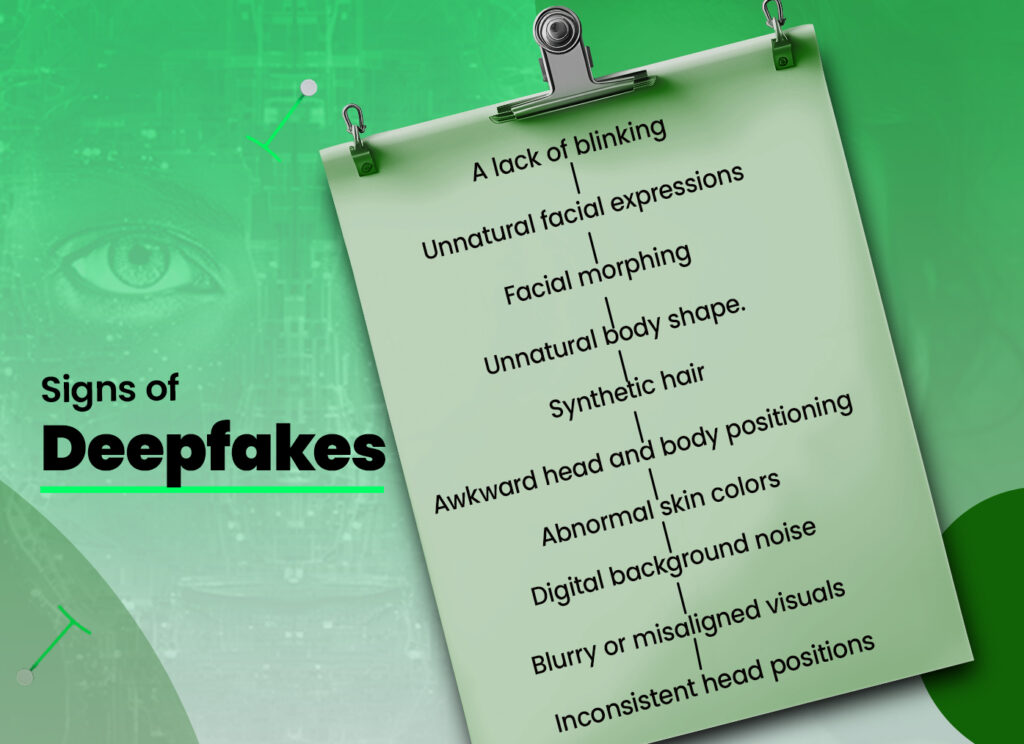Remember that viral video of a superstar lip-syncing a popular song? Or that news clip of a famous politician saying something they never ever said? Chances are, you’ve seen a deepfake.
Just last week, I stumbled upon a video of a famous tech CEO giving a speech I knew he couldn’t have given. The video—the voice and mannerisms—were realistic. It was then that I discovered the terrifying capability of deepfakes.
These hyper-sensible AI-generated videos can manipulate public opinion, unfold incorrect information, or damage reputations. As digital media users, we are constantly bombarded with data, and it’s becoming increasingly hard to determine reality from fiction.
That said, this blog illuminates you with the world of deepfakes, exploring the techniques used to create them and how to stay safe from deepfakes.
Sounds exciting, right? Dive deep into the world of deepfake, then.
Happy reading!
What is a Deepfake?
To keep it short, a deepfake is a digitally manipulated video, audio, or photo that uses artificial intelligence to create realistic yet entirely false media content. This was originally created for innovative and entertainment functions; deepfakes now serve diverse functions, some too threatening.
Additionally, by leveraging robust AI technology, creators can make someone look to say or do things they actually haven’t, which can have far-attaining implications.
Why Are Deepfakes Used?
The usage of deepfake can both be beneficial and harmful. Let’s see where deepfakes are utilized:
- Entertainment and Media: Many deepfakes are made for amusement, satire, or to make historical characters “come to life” in documentaries.
- Political Manipulation: Regretfully, deepfakes are being utilized growingly, especially in politics, to circulate false information, influence public opinion, or damage reputations, crashing the political figure’s image.
- Online Scams and Fraud: Scammers have started utilizing deepfakes to copy individuals. This allows them to conduct phishing scams or steal private data.
- Identity Theft: Criminals can abuse deepfakes to pose as individuals in private communications or financial transactions, resulting in identity theft.
Deepfakes threaten cybersecurity and data protection. They are an effective weapon fraudsters and scammers use to skew reality for their own benefit.
Related Read: The Evolution of Internet Scams: From Phishing to Deepfakes
How Are Deepfakes Made?
Simply put, deepfakes are generated while leveraging machine learning and deep learning algorithms. This is specifically the amalgamation of Generative Adversarial Networks (GANs) and face-swapping technology.
Here’s how it works:
- Data Collection: The creator collects the target’s multiple pictures and video records to train AI on their features, expressions, and moves.
- AI Training: The AI uses GANs, a deep learning model in which two neural networks work collectively. One community generates false content, while the other tries to analyze it, refining the last result until the fake is identical to real media.
- Face-Swapping & Editing: The creator covers the target’s face using editing software over the original audio or video. The finished product is frequently polished to make the information more believable.
Technologies Used to Create Deepfakes
Deepfakes depend upon superior or robust technology like GANs (Generative Adversarial Networks) and deep neural networks, which can examine and recreate human faces, voices, and gestures. As this technology evolves, recognizing deepfakes with the naked eye turns harder, making cybersecurity tools essential for cyber safety.
Read More: How to Access the Dark Web?: A Comprehensive Guide
How to Spot Deepfakes

Here are some red flags to help you spot deepfakes on social media:
- Unnatural Eye Movement or Blinking: Unnatural or mechanical movements result from deepfake technology’s inability to mimic natural eye and blinking patterns accurately.
- Inconsistent Lighting: Be attentive towards the lighting on the subject’s face’s lighting. Deepfakes can never match the illumination of the environment correctly.
- Lip Syncing Issues: Pay great attention to the lips as they talk; deepfakes have slightly out-of-synch lip motions, particularly during complex dialogue.
- Odd Facial Expressions or Skin Tone: Deepfake faces may have uneven skin tones or no natural facial expressions due to AI rendering constraints.
- Audio Mismatch or Robotic Voice: A deepfake may be present if the audio sounds overly artificial or robotic or doesn’t correspond with the visual movements. Artificial voices with little emotional nuance are used in some deepfakes.
Don't Let Deepfakes Mislead You!
AVP Suite helps you identify and avoid deepfake content while shielding you from digital manipulation.
Start Your Free Trial!

How to Stay Safe from Deepfakes
- Verify Sources: Double-check with trustworthy sources to ensure their truth if you encounter anything startling or questionable.
- Report Deepfakes: Social media sites like Facebook and Twitter offer tools for reporting modified or fraudulent information. Reporting will help stop the spread.
- Educate Yourself and Others: Do assist friends and relatives to be alert, and educate them about deepfakes.
- Use Reliable Security Software: Safeguard your devices with online security software such as AVP Suite Antivirus, which can identify and defend against phishing and deepfake scams.
Also Read: Cybersecurity in the Age of AI: Changing the Game for Hackers and Defenders
How AVP Suite Can Protect You from Deepfakes
AVP Suite supports cutting-edge features that help protect customers from online threats, including deepfake scams and other virtual deceptions.
Here’s how:
- Real-Time Threat Detection: AVP Suite’s AI-powered detection monitors your online activities to alert you about suspicious media, helping you avoid deepfake content material on social media.
- Phishing and Fraud Protection: AVP Suite’s anti-phishing technology guards against scams frequently accompanying deepfake media, securing your vital data. It keeps your data exclusively yours.
- VPN for Privacy Protection: The AVP Suite antivirus with VPN protects your internet connection, secures your IP address, and ensures your data remains encrypted when browsing.
- Online Data Protection: AVP Suite’s data protection features ensure that your information is safe from deepfake scams.
Stay Protected with AVP Suite
Keeping your online activities safe takes more than a watchful eye in a world where digital deceit is becoming more challenging to spot. Arm yourself with AVP Suite Antivirus Software to protect your data, identify cyber threats early, and avoid deepfake scams with 360-degree dynamic protection.
Protect yourself today! Try AVP Suite Antivirus and enjoy browsing without fear of falling for deepfake scams or online fraud.
Download AVP Suite for Free!



